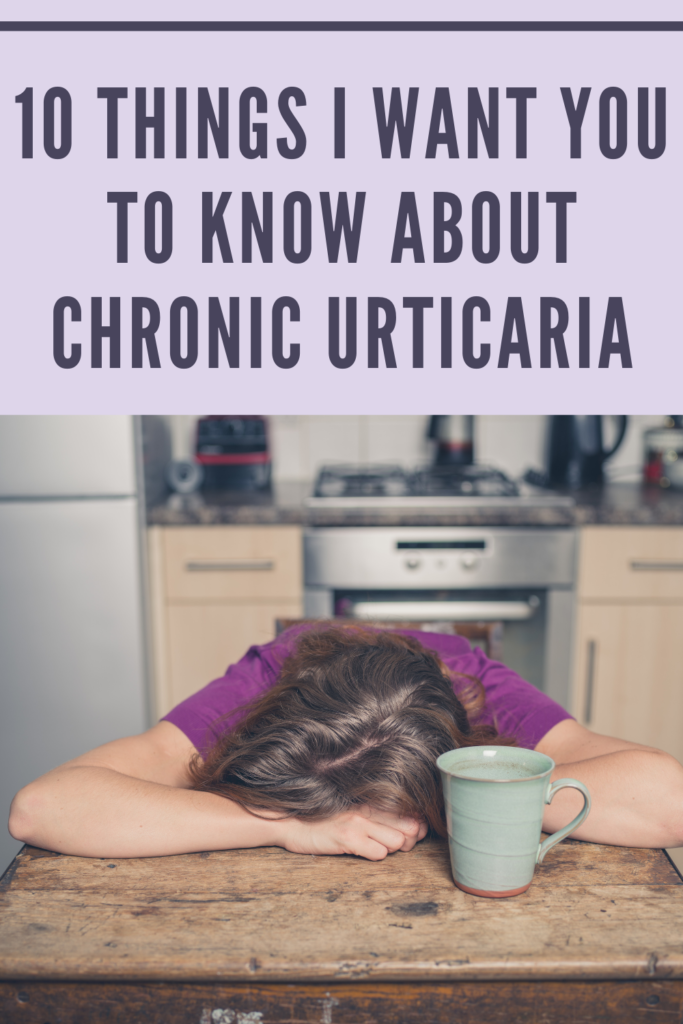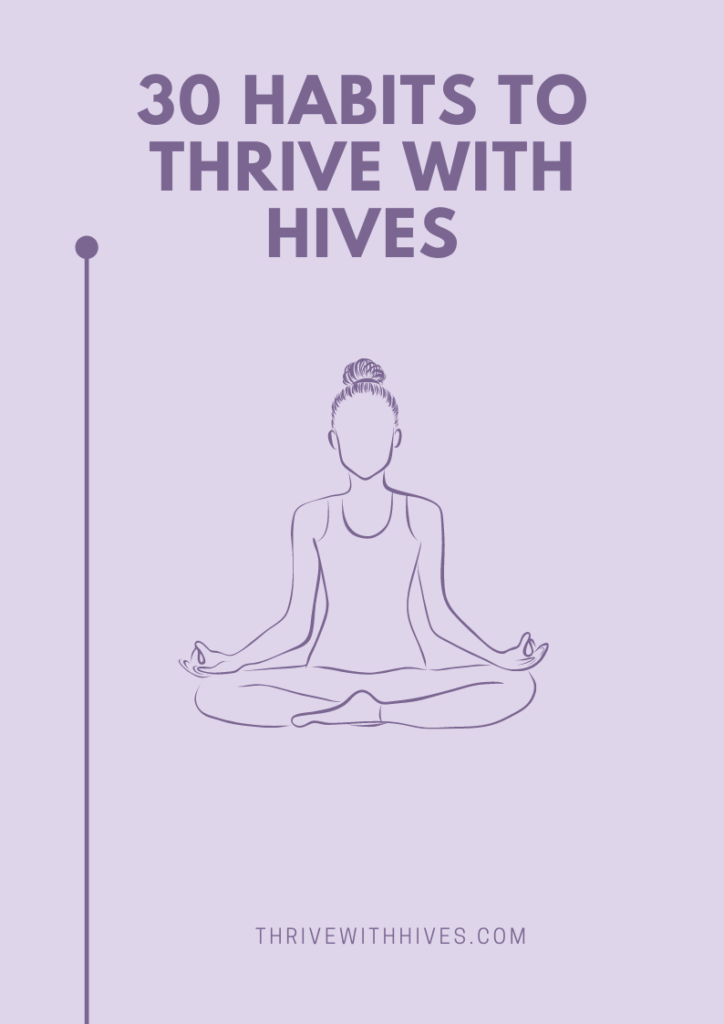10 Things I want you to know about Chronic Urticaria

Chronic Spontaneous Urticaria, previously known as Chronic Idiopathic Urticaria, affects 0.1–5% of the population. It is rarely given the attention that it merits. If you tell people that you have Lupus, Fibromyalgia, or rheumatoid arthritis, although they may not be overly familiar with the disease, they have heard of it and can empathize that you must be suffering to some degree. CSU is thought of as “just a rash” and is rarely given much more thought. I need you to understand that this disease is life-altering and can be devastating. Here is what I want you to know about Chronic Urticaria.
10 Things I want you to know about Chronic Urticaria:
1) Look past the skin
One of the most frustrating things about this disorder is that people often think of it simply as a skin rash. The name itself means chronic hives, it feels definitive and doesn’t leave room for people to investigate further than what they can see. As a nurse, I will admit that I never thought to look past the name. I thought of it as a symptom and not a disease. That is until I found myself suffering from this condition and researched it extensively. I realize now that this disease doesn’t get the attention it deserves.
Physicians will refer you to dermatology and prescribe topical medications if they aren’t familiar with chronic urticaria. Even worse, many brush it off as a psychiatric disorder and refuse to further investigate. Or they say “it will resolve on its own”. Ten years later and it’s still with me daily. It took me almost 5 years just to get a referral to see an immunologist, who diagnosed me within days.
Chronic Spontaneous Urticaria is not just a skin rash. It is a disorder that affects the immune system, more specifically, mast cells. Mast cells are most heavily concentrated under the skin, in the gastrointestinal tract, and in the lungs. The release of histamines is an immune response that causes inflammation and can lead to various symptoms throughout the body. Add in the side effects of the various drugs that we take to control those symptoms, paired with insomnia from the agony of hell’s itch as we attempt to sleep. CSU causes a cascade of life-altering repercussions.
2) Every Move I Make Revolves Around My Disease
Can I eat this?
We are in a chronic state of inflammation and our cells are releasing too much histamine, we have to be careful about what we put in our body. Many foods that are high in histamines, such as fermented foods, can cause our symptoms to flare. Some have found that eating a low inflammatory diet, such as Paleo, helps to decrease the overall burden of the systemic symptoms caused by inflammation. Please don’t brush us off as being trendy because we avoid gluten or picky because we don’t drink Kombucha or eat sour kraut. We are trying to manage the burden of this disease best we can and by any means necessary.
If I exercise will I flare?
Yes, exercise can cause flares in many. No, we aren’t just unmotivated or making excuses. Cholinergic Urticaria can be brought on by cold, heat, friction, or sweat and may be separate from or go along with CSU. In rare cases, it can even cause life-threatening anaphylaxis. Exercise-induced Urticaria is real.
What to wear?
Pressure urticaria causes swelling and hives at the site where the pressure is applied. Bra straps, tight jeans, and compression wear are some examples of clothing that can cause us to break out.
Sensitive skin also is a common complaint and that fabric may not work for our body. We need loose-fitting and breathable clothing to be comfortable.
3) You may not see it but it’s still there
You may not see my hives but I feel them. Sometimes the itch or pain comes without the hives or swelling. Sometimes it’s not the itch that is affecting me at all. It’s the other symptoms. It’s the knowledge that it’s always there and I have to be mindful of what I do that may cause it to flare up.
4) I am exhausted
Between the lack of sleep from the constant itch and the side effects of medications, I am overwhelmed with exhaustion at times. Day to day there is general fatigue and some days it’s so bad that I can hardly function.
I am trying my best but some days it takes all I have to pull myself out of bed in the morning.
5) I feel guilty
My house isn’t as clean as it should be, my kids have too much screen time, I forget to text my friends back until days later, I am not as intimate with my partner as I should be, I have a short fuse. I could go on and on. Lack of sleep leads to irritability and if I’m taking steroids, watch out! Who can think when they don’t sleep? I’m always forgetting important things.
I feel really bad about it. I am doing my best to keep it all together but it’s honestly just so overwhelming some days. I compare myself to other mothers and I feel intense guilt. I feel unworthy of the relationships that mean the most to me. I feel like I am a bad friend, sister, wife, and mother.
6) It’s not my fault
It isn’t because I’m stressing too much, using the wrong detergent, or eating the wrong foods. Changing those things may help me to prevent flares but they aren’t a solution. I can change my whole life and environment and still break out daily. I do what I can to reduce my symptoms but I do not have hives simply because I had a public speaking engagement or job interview that stressed me out. It’s much more complex than that.
7) I am depressed
I often feel helpless and hopeless. No doctor can predict how long this will last or if it will ever go away at all. I don’t sleep well and feel tired all the time. I have brain fog and it’s hard to concentrate or remember things at times. I have trouble keeping up with the housework, taking care of the kids, taking care of myself. We talked above about the guilt I carry.
This isn’t just itchy skin, it alters the way we live. It has caused much desperation and depression to the point of feeling suicidal. We are not over-dramatic or attention-seeking. This is a real disease and the effects are truly devastating.
8) I feel judged by you
It’s hard to imagine what it’s like to live with this. I know that. I know that people see it as something simple when it really is quite complex. I see the way you look at me with doubt. I have heard all the comments about it being in my head, not being that bad or that I am dramatic. Even comments that are meant to be supportive can sometimes be taken as an insult despite your intention.
9) I feel alone
Isolation is just another of the many burdens we face. We don’t feel understood, and after hearing so many people tell us things that hurt, we learn to stay home. If I am flaring I may cancel plans, call into work or not answer my phone. I am embarrassed and I even have a sense of shame, as if I did something wrong to deserve this.
I don’t socialize as much as I used to. I never know when I am going to break out in hives and swelling on my face and body and it’s embarrassing. People often make comments that further damage my already fragile self-esteem.
It’s really hard to go through something that is so life-altering but people see it as a simple annoyance. It’s hurtful when people say things that minimize the impact or try to compare it to something they have experienced.
10) I want your support
The impact is definitely more than just skin deep. My whole world has been flipped upside down.
If you know someone with Chronic Urticaria please show them love, patience and support. Ask how you can help or just check in once in a while.
Please read check out Chronic Urticaria FAQ to better understand this condition.
Thank you for taking the time to read this. I hope that it helps you see past the skin rash and realize how much of an impact it has on quality of life.

If you have Chronic Urticaria, I would love permission to send you email updates.
Sign up here for my email list and get a free guide: 30 Habits to Thrive with Hives.

I have had this for over 21 years and many people say, oh I am sorry I have had hives and they suck.
Most have no clue how bad they suck!!
Yes, people like to compare it to that one time they had hives. It’s nothing like what we go through with this. I try my best to keep their intentions in mind but it does get old.
I’ve had them for 1 year.
Prior to that it has been off and on for 38 years.
No answers. No comfort.
It’s so frustrating and isolating but you aren’t alone ❤️
Wow…. Hate to hear of so many people with this and basically, you just live with this. I had it for over a year when living in Italy, stress of overseas move and family issues….Zyrtec helped, but when I stopped taking it, my lips swelled…. So have taken it for five years….. now, outta no where, hives again, swollen lips, worse than ever…… I get pushed from one doctor to another, “sorry, nothing we can do for you! Come back when your tongue or throat swells!” Are you kidding me? I’m afraid to sleep with swollen lips and you can forget the CPAP machine when I’m swollen! I’m in Nebraska, hoping to find a good Allergist
Ugh. That’s so frustrating. It can be hard to find a doctor who is knowledgeable about this. Let us know if you find a good one. ???
I’m on my 3rd year. Initially got into remission with xolair after 6 months and was able to taper off all the antihistamines I was taking (anywhere between 6-12 a day.) After a year of no hives started to taper the Xolair to see if spontaneous remission had occurred. Within a year symptoms came back. And I get ALL the symptoms of CSU; Skin and deep tissue swelling, edema, Joint Pain, Tachycardia, and Gastrointestinal issues. Now I’m taking all the antihistamines again and Xolair injections twice a month and still struggling. Low histamine or paleo diets don’t do anything for me and also tried fasting. Still same issues..can only hope for next remission..soon.
How frustrating. Maybe a functional medicine doctor could help. It sounds like it could be MCAS or mold poisoning.
I have high quality air purifiers and no mold was detected in our home. My Immunologist doesn’t believe it to be MCAS because my tryptan levels are always normal as with the rest of my blood work..